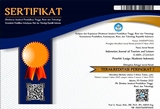From Devolution to Private Enterprise: The Dynamics of Ecotourism Governance in Gunung Halimun National Park
Abstract
This article examines changes of governance regime in the Curug Nangka ecotourism area, Bogor. Initially a production forest managed by Perum Perhutani (state-owned company), it later became a conservation forest under the management of the Gunung Halimun Salak National Park Agency, and is now managed by a private company. These shifts in governance regimes have significantly impacted community involvement in managing the ecotourism area. A survey of 32 respondents, supported by in-depth interviews, revealed that Perhutani’s governance regime scored highest in legitimacy, voice, strategic vision, and equity indicators, followed by the National Park Agency, with the private company ranking lowest. However, the private company performs better management and revenue-sharing with local communities and village authorities. As a result, in terms of performance and accountability indicators, most respondents ranked the private company higher than the other two regimes. By comparing these three governance regimes, this article contributes to identifying key aspects in the governance of ecotourism area that ensure community participation and explores community responses to these changes of governance regime.
Keywords
Full Text:
PDFReferences
Adiwibowo, S, Shohibuddin, M, Savitri, L.A, Sjaf, S, & Yusuf, M. (2009). Analisis Isu Pemukiman di Tiga Taman Nasional Indonesia. Sajogyo Institute.
Arida, I.N.S. (2017). Ekowisata: Pengembangan, Partisipasi Lokal dan Tantangan Ekowisata. Cakra Press.
Ayuningtyas, D. I., & Dharmawan, A. H. (2015). Dampak Ekowisata Terhadap Kondisi Sosio-Ekonomi dan Sosio-Ekologi Masyarakat di Taman Nasional Gunung Halimun Salak. Sodality: Jurnal Sosiologi Pedesaan, 5(3), 247–258. https://doi.org/10.22500/sodality.v5i3.9691
Dale, C. J. P., & Afioma, G. (2020). Puzzling Confluence of Conservation and Ecotourism in Komodo National Park, Indonesia. Japan-ASEAN Transdisciplinary Studies Working Paper Series, No. 10.
Dhalyana, D., & Adiwibowo, S. (2015). Pengaruh Taman Wisata Alam Pangandaran Terhadap Kondisi Sosial Ekonomi Masyarakat. Sodality: Jurnal Sosiologi Pedesaan, 1(3), 182–199. https://doi.org/10.22500/sodality.v1i3.9402
Eagles, P. F. J. (2008). Governance Models for Parks, Recreation, and Tourism. In K. S. Hanna, D. A. Clark, & D. S. Slocombe (Eds.), Transforming Parks and Protected Areas: Policy and Governance in a Changing World (pp. 39–61). Routledge.
Eagles, P. F. J. (2009). Governance of Recreation and Tourism Partnerships in Parks and Protected Areas. Journal of Sustainable Tourism, 17(2), 231–248. https://doi.org/10.1080/09669580802495725
Ekayani, M., Nuva, Yasmin, R., Sinaga, F., & Maaruf, L. O. M. (2014). Wisata Alam Taman Nasional Gunung Halimun Salak: Solusi Kepentingan Ekologi dan Ekonomi. Jurnal Ilmu Pertanian Indonesia, 19(1), 29–37. https://journal.ipb.ac.id/index.php/JIPI/article/view/8403
Ginting, N., Rizky, M., Siregar, C. R., Triska, E., Ayu, P., Surya, W., & Pratiwi, P. (2019). Kajian Aspek Partisipasi Masyarakat Pada Kawasan Ekowisata Tangkahan. Talenta Conference Series: Energy and Engineering (EE), 2(1), 236–248. https://doi.org/10.32734/ee.v2i1.412
Ginting, Y., Dharmawan, A. H., & Soehartini S. (2010). Interaksi Komunitas Lokal di Taman Nasional Gunung Leuser: Studi Kasus Kawasan Ekowisata Tangkahan, Sumatera Utara. Sodality: Jurnal Transdisiplin Sosiologi, Komunikasi, dan Ekologi Manusia, 4(1), 39–58. https://journal.ipb.ac.id/index.php/sodality/article/view/5853
Goodwin, H. (1996). In Pursuit of Ecotourism. Biodiversity & Conservation, 5(3), 277–291. https://doi.org/10.1007/BF00051774
Graham, J., Amos, B., & Plumptre, T. (2003). Governance Principles for Protected Areas in the 21st Century. Institute on Governance.
Hamann, R., Hönke, J., & O’Riordan, T. (2018). Environmental and Natural Resources. In T. Risse, T. A. Börzel, & A. Draude (Eds.), The Oxford Handbook of Governance and Limited Statehood (pp. 498–519). Oxford University Press.
Honey, M. (2008). Ecotourism and Sustainable Development: Who Own Paradise? Island Press.
Mangngi Tiga, M. R., Putri, E. I. K., & Ekayani, M. (2019). Persepsi Masyarakat Desa Katikuwai dan Desa Praing Kareha Terhadap Pengembangan Ekowisata di Taman Nasional Matalawa, NTT. Sodality: Jurnal Sosiologi Pedesaan, 7(1), 34–40. https://doi.org/10.22500/sodality.v7i1.22866
Monica, D. (2006). Analisis Sosial Ekonomi Sistem Kemitraan Pengelolaan Wana Wisata Curug Nangka KPH Bogor Perum Perhutani Unit III Jawa Barat dan Banten. [Undergraduate Thesis]. Institut Pertanian Bogor.
Ni’am, L., Koot, S., & Jongerden, J. (2021). Selling Captive Nature: Lively Commodification, Elephant Encounters, and the Production of Value in Sumatran Ecotourism, Indonesia. Geoforum, 127, 162–170. https://doi.org/10.1016/j.geoforum.2021.10.018
Rahayu, N. (2006). Analisis Proses Pengambilan Keputusan dan Preferensi Konsumen terhadap Wana Wisata Curug Nangka KPH Bogor Perum Perhutani Unit III Jawa Barat dan Banten [Undergraduate Thesis]. Institut Pertanian Bogor.
Shohibuddin, M., Cahyono, E., Habiburrachman, Ahsani, F., & Kusumastuti, G. (2023). Kebijakan Perhutanan Sosial yang “Tutup Mata”? Kasus Komunitas Adat di Pinggir Hutan Egon Ilinmedo, Kabupaten Sikka, Nusa Tenggara Timur. Prosiding Konferensi Nasional Sosiologi (PKNS) X: Hubungan Masyarakat Dan Elit Dalam Mewujudkan Indonesia Maju, 400–407. https://pkns.portalapssi.id/index.php/pkns/article/view/132
Sudders, M., & Nahem, J. (2004). Governance Indicators: A Users’ Guide. United Nations Development Programme.
Wall, G. (2000). Ecotourism. In J. Jafari (Ed.), Encyclopedia of Tourism (pp. 165–166). Routledge.
Weaver, D. B. (2008). Ecotourism. John Wiley & Sons.
Widyanti, E. (2019). Analisis Dampak Ekonomi dan Mekanisme Penarikan Tiket Wisata Curug Nangka Desa Sukajadi, Kecamatan Tamansari, Kabupaten Bogor, Jawa Barat [Undergraduate Thesis]. Institut Pertanian Bogor.
Wu, P. (2012). A Mixed Methods Approach to Technology Acceptance Research. Journal of the Association for Information Systems, 13(3), 172–187. https://doi.org/10.17705/1jais.00287
DOI: https://doi.org/10.36256/ijtl.v6i2.482
Refbacks
- There are currently no refbacks.
Copyright (c) 2025 Indonesian Journal of Tourism and Leisure

This work is licensed under a Creative Commons Attribution-NonCommercial-ShareAlike 4.0 International License.
Indonesian Journal of Tourism and Leisure Indexed and Archieved By:

Indonesian Journal of Tourism and Leisure is licensed under a Creative Commons Attribution-NonCommercial-ShareAlike 4.0 International License.












